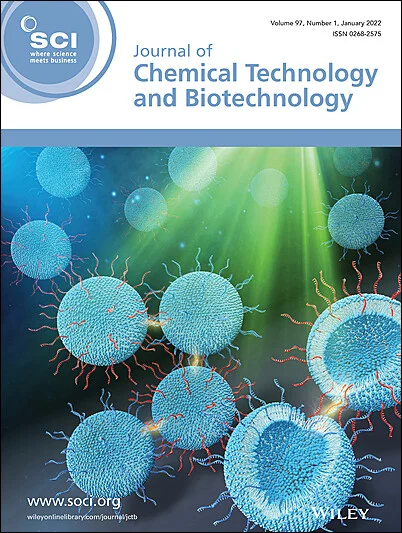Zhenzhao Pei, Haiyang Zhao, Haipeng Wang, Zhuyue Fu, Kanghua Yang, Kang Mao, Yan Liu
求助PDF
{"title":"掺杂铌对低温 NH3-SCR 反应 MnFeOx 催化剂的影响","authors":"Zhenzhao Pei, Haiyang Zhao, Haipeng Wang, Zhuyue Fu, Kanghua Yang, Kang Mao, Yan Liu","doi":"10.1002/jctb.7692","DOIUrl":null,"url":null,"abstract":"<div>\n \n \n <section>\n \n <h3> BACKGROUND</h3>\n \n <p>Manganese-based catalysts were considered the most promising catalysts for low-temperature selective catalytic reduction (NH<sub>3</sub>-SCR) reactions. In this work, a series of Mn<sub>3</sub>Fe<sub>2</sub>Nb<sub>y</sub>O<sub>x</sub> catalysts were synthesized by co-precipitation method for low-temperature NH<sub>3</sub>-SCR and SO<sub>2</sub> tolerance tests.</p>\n </section>\n \n <section>\n \n <h3> RESULTS</h3>\n \n <p>The catalysts were characterized by BET, SEM, XRD, XPS, H<sub>2</sub>-TPR, and NH<sub>3</sub>-TPD. Mn<sub>3</sub>Fe<sub>2</sub>Nb<sub>0.01</sub>O<sub>x</sub> exhibited exceptionally high activity with a conversion of almost 100% from 80°C to 240°C, and a NO conversion of more than 75% at 40°C, while the NO conversion at 140°C in the presence of 100 ppm SO<sub>2</sub> remained above 90% for 4 h.</p>\n </section>\n \n <section>\n \n <h3> CONCLUSION</h3>\n \n <p>According to the characterization results, Nb modification can expand the specific surface area of the catalyst, improve the structure of the catalyst, and make the active components on the catalyst surface more dispersed. Moreover, the Nb-modified catalyst reduced the content of Mn<sup>2+</sup> on the catalyst surface and strengthened the electronic interactions between elements. The synergistic effects among Mn, Fe, and Nb facilitate the formation of more chemically adsorbed oxygen, which enhances the reduction capacity of the catalyst. This facilitates the adsorption of NH<sub>3</sub> by the catalyst at low temperatures and promotes the process of low-temperature NH<sub>3</sub>-SCR reaction. More importantly, the Nb-modified catalyst possessed more weak acid sites, and the higher surface acidity was conducive to the inhibition of SO<sub>3</sub> generation, which enhanced the sulfur poisoning resistance of the catalyst. © 2024 Society of Chemical Industry (SCI).</p>\n </section>\n </div>","PeriodicalId":15335,"journal":{"name":"Journal of chemical technology and biotechnology","volume":"99 8","pages":"1889-1896"},"PeriodicalIF":2.8000,"publicationDate":"2024-06-12","publicationTypes":"Journal Article","fieldsOfStudy":null,"isOpenAccess":false,"openAccessPdf":"","citationCount":"0","resultStr":"{\"title\":\"Effect of Nb-doping on the MnFeOx catalyst for NH3-SCR reaction at low-temperature\",\"authors\":\"Zhenzhao Pei, Haiyang Zhao, Haipeng Wang, Zhuyue Fu, Kanghua Yang, Kang Mao, Yan Liu\",\"doi\":\"10.1002/jctb.7692\",\"DOIUrl\":null,\"url\":null,\"abstract\":\"<div>\\n \\n \\n <section>\\n \\n <h3> BACKGROUND</h3>\\n \\n <p>Manganese-based catalysts were considered the most promising catalysts for low-temperature selective catalytic reduction (NH<sub>3</sub>-SCR) reactions. In this work, a series of Mn<sub>3</sub>Fe<sub>2</sub>Nb<sub>y</sub>O<sub>x</sub> catalysts were synthesized by co-precipitation method for low-temperature NH<sub>3</sub>-SCR and SO<sub>2</sub> tolerance tests.</p>\\n </section>\\n \\n <section>\\n \\n <h3> RESULTS</h3>\\n \\n <p>The catalysts were characterized by BET, SEM, XRD, XPS, H<sub>2</sub>-TPR, and NH<sub>3</sub>-TPD. Mn<sub>3</sub>Fe<sub>2</sub>Nb<sub>0.01</sub>O<sub>x</sub> exhibited exceptionally high activity with a conversion of almost 100% from 80°C to 240°C, and a NO conversion of more than 75% at 40°C, while the NO conversion at 140°C in the presence of 100 ppm SO<sub>2</sub> remained above 90% for 4 h.</p>\\n </section>\\n \\n <section>\\n \\n <h3> CONCLUSION</h3>\\n \\n <p>According to the characterization results, Nb modification can expand the specific surface area of the catalyst, improve the structure of the catalyst, and make the active components on the catalyst surface more dispersed. Moreover, the Nb-modified catalyst reduced the content of Mn<sup>2+</sup> on the catalyst surface and strengthened the electronic interactions between elements. The synergistic effects among Mn, Fe, and Nb facilitate the formation of more chemically adsorbed oxygen, which enhances the reduction capacity of the catalyst. This facilitates the adsorption of NH<sub>3</sub> by the catalyst at low temperatures and promotes the process of low-temperature NH<sub>3</sub>-SCR reaction. More importantly, the Nb-modified catalyst possessed more weak acid sites, and the higher surface acidity was conducive to the inhibition of SO<sub>3</sub> generation, which enhanced the sulfur poisoning resistance of the catalyst. © 2024 Society of Chemical Industry (SCI).</p>\\n </section>\\n </div>\",\"PeriodicalId\":15335,\"journal\":{\"name\":\"Journal of chemical technology and biotechnology\",\"volume\":\"99 8\",\"pages\":\"1889-1896\"},\"PeriodicalIF\":2.8000,\"publicationDate\":\"2024-06-12\",\"publicationTypes\":\"Journal Article\",\"fieldsOfStudy\":null,\"isOpenAccess\":false,\"openAccessPdf\":\"\",\"citationCount\":\"0\",\"resultStr\":null,\"platform\":\"Semanticscholar\",\"paperid\":null,\"PeriodicalName\":\"Journal of chemical technology and biotechnology\",\"FirstCategoryId\":\"5\",\"ListUrlMain\":\"https://onlinelibrary.wiley.com/doi/10.1002/jctb.7692\",\"RegionNum\":4,\"RegionCategory\":\"生物学\",\"ArticlePicture\":[],\"TitleCN\":null,\"AbstractTextCN\":null,\"PMCID\":null,\"EPubDate\":\"\",\"PubModel\":\"\",\"JCR\":\"Q3\",\"JCRName\":\"BIOTECHNOLOGY & APPLIED MICROBIOLOGY\",\"Score\":null,\"Total\":0}","platform":"Semanticscholar","paperid":null,"PeriodicalName":"Journal of chemical technology and biotechnology","FirstCategoryId":"5","ListUrlMain":"https://onlinelibrary.wiley.com/doi/10.1002/jctb.7692","RegionNum":4,"RegionCategory":"生物学","ArticlePicture":[],"TitleCN":null,"AbstractTextCN":null,"PMCID":null,"EPubDate":"","PubModel":"","JCR":"Q3","JCRName":"BIOTECHNOLOGY & APPLIED MICROBIOLOGY","Score":null,"Total":0}
引用次数: 0
引用
批量引用

 求助内容:
求助内容: 应助结果提醒方式:
应助结果提醒方式:


